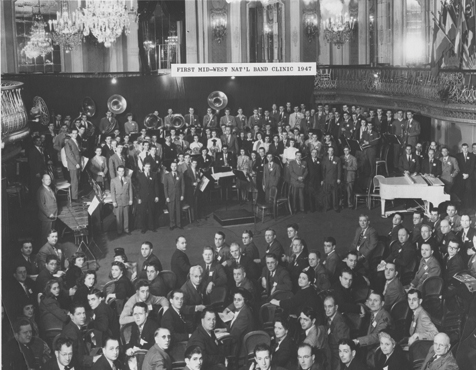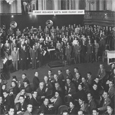
In the November-December 1946 issue of The Instrumentalist, only its second issue, the following inauspicious blurb appeared on page 35:
BAND CLINIC
Col. Harold Bachman of Chicago and Irving Tallmadge of Maywood, Illinois and Interlochen, will be guest conductors at a band clinic at the VanderCook School of Music in Chicago December 6-7. VanderCook will accept thirty more GIs when the second semester opens.
This originally unnamed clinic was inspired by the desire to make local band directors aware of how much new music was being written for bands. From its humble beginnings in 1946, when 120 people packed themselves into a YWCA gymnasium on the west side of Chicago for a reading session planned by Howard Lyons, Neil A. Kjos, Sr., and H.E. Nutt, the Midwest Clinic has grown into a gathering of thousands of band and orchestra directors from all over the world. The timeline below includes interesting trivia, changes to the clinic, and notable firsts.
1947: The first and only All-Request Band. The 800 attendees were given the option to request a performance of any piece they had seen in the exhibit areas. Named The Mid-West Band Clinic, the clinic is moved to the Hotel Sherman (later renamed Sherman House) at 100 West Randolph Street.
1950: The first adult band, the Chicago Salvation Army Band, performs. This is also the first year to feature ensembles from states other than Illinois and Indiana; ensembles from Michigan and Texas performed.
1951: Renamed The Mid-West National Band Clinic. The first orchestra, the Champaign Schools Orchestra, performs.
1953: In addition to the first stage band (The Bengal Debs Orchestra, an all-female – except for one male vocalist – group from Stark High School in Orange, Texas) and the first military band (the United States Air Force Band), this year’s clinic also featured an ensemble of 75 horns assembled by Max Pottag.
1954: The Kiel (Wisconsin) Municipal Band becomes the first such group to perform.
1959: The Executive Board rules that all hospitality receptions must close no later that 1:00 a.m., leading to the popularity of the Ham n’ Egger, a breakfast-anytime restaurant around the corner from Sherman House as a late-night gathering place.
1962: The first Orchestra Day occurs. The Medal of Honor is awarded for the first time, with recipients including Colonel Harold Bachman, Glenn Cliffe Bainum, Karl L. King, and Commander Charles Brendler.
1966: This year’s inaugural Mid-West After Hours session is An Hour with Merle Evans, Bandmaster, Ringling Brothers and Barnum & Bailey Circus.
1968: The name is changed to The Midwest National Band and Orchestra Clinic.
1970: The last clinic without a jazz band performance.
1971: To celebrate the 25th anniversary, the founders (Neil A. Kjos, Sr., Howard Lyons, and H.E. Nutt) are awarded the Medal of Honor along with Richard Brittain, who conducted the Vander-Cook Band for all 25 of its Midwest performances.
1973: The first year at the Hilton. Sherman House is demolished this year.
1974: Maynard Ferguson’s Band performs.
1981: Chicago’s first TubaChristmas happens at Midwest.
1982: The Tremper High School (Kenosha, Wisconsin) Golden Strings are the first strolling strings group to perform at Midwest.
1986: The name is changed to the Mid-West International Band and Orchestra Clinic. This year also marks the appearance of the first university band (Michigan State Wind Ensemble), university jazz band (University of Minnesota Jazz Ensemble), and ensemble from outside North America (the Norwegian National Youth Band).
1988: The first college night features 33 colleges and universities. This is also the first year that college credit from the University of Miami is offered.
1989: The Teacher Resource Center is created.
1991: The Music Industry Award is established. William F. Ludwig, Sr. is the first recipient.
1992: The International Award is established. The first recipients are Toshio Akiyama and Russell Hammond.
1996: On its 50th anniversary, the name is changed to The Midwest Clinic, An International Band and Orchestra Conference. To celebrate 50 years, the clinic commissioned Ron Nelson’s Resonances III for orchestra and extra brass and Karel Husa’s Mid-West Celebration Fanfare for brass.
2001: Online pre-registration is offered for the first time.
2004: The first rehearsal labs occur.
2006: Clinics for high school students are offered.
2009: Midwest moves to McCormick Place West. Richard C. Crain is elected President.
2012: The first orchestra reading session occurs, and the High School Institute is first offered.
2015: Small Schools and Title I tracks are introduced.





